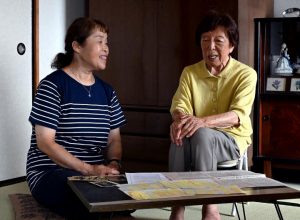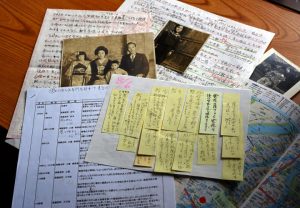First record of Shimada’s A-bomb experience completed supported by former coworker
Aug. 3, 2024
Experiencing atomic bombing at age 14
G7 Hiroshima Summit as turning point
by Michio Shimotaka, Staff Writer
Eiko Shimada, 93, an A-bomb survivor living in Hiroshima’s Minami Ward, lost her father in the atomic bombing. She has written her A-bomb experience for the first time this year, 79 years after the bombing. She had been hesitant to tell her story, but she decided to hand down her memory of the terrible tragedy she experienced at age 14 to future generations with support from her former coworker, Yoko Shiroishi, 65. Ms. Shiroishi, a resident of Naka Ward, had her own regrets that she should have listened to her parents’ war experiences.
In 1945, Ms. Shimada was living in Higashikanon-machi (now part of Nishi Ward). She was a third-year student at Yamanaka Girls’ High School affiliated with Hiroshima Women’s Higher Normal School (now Fukuyama Junior and Senior High School affiliated with Hiroshima University). On the morning of August 6, she was at a factory in Minamikanon-machi as a mobilized student. “There was a flash as if lightning struck.” She quickly crawled under a desk and was unhurt.
She went back to her home on the same day, but she had to leave in no time because of the heat. Two days later, a neighbor told her that her father, Mutsumi, then 44, had been trapped under a collapsed house. After digging out the remains of her father from the ruins of the fire with the help of others, she finally met her mother, who had escaped from their home.
After the war, Ms. Shimada hardly shared her A-bomb experience with others in public, thinking, “It was not only us that experienced something extraordinary.” However, about 40 years ago, she wrote her memory of the fateful day on the back of flyers and sticky notes as she did not want to forget. “I heard that someone saw (my mother) walking alone toward Koi. Was she the only one who survived? What about my father? I was anxious.” “I put white bones into a milk can,” she wrote.
The summit meeting of the Group of Seven industrialized nations held in Hiroshima in May last year was a turning point for her. When she saw an A-bomb survivor in her mid-80s tell her account, Ms. Shimada thought, “I was 14 and approaching adulthood then, and one of the older survivors who are alive. I think I can talk about the event from a slightly different perspective.” Soon after the Hiroshima summit, she confided her thoughts to Ms. Shiroishi, who used to work with her and is a friend of more than 40 years’ standing.
Ms. Shiroishi visited Ms. Shimada’s house many times and organized her handwritten notes and memories using a computer. She also encouraged her to apply for a program in which writing assistants record survivors’ experiences. This program is provided by the Hiroshima National Peace Memorial Hall for the Atomic Bomb Victims. Ms. Shimada’s record was completed earlier this year, and she is delighted. “I wanted to pass down my memories, but in reality, what could I have done at my age? I couldn’t have done it alone,” she said.
Ms. Shiroishi is originally from Tokyo and has no close relatives who experienced the atomic bombing. But her father went to war on mainland China, and a bullet remained in his back even after he was demobilized. “If he was shot, he might have shot others, too. I was too scared to ask him what happened on the battlefield,” she said. Her mother told her that she had walked through the ruins of an air raid where dead bodies lay, but she could not ask further questions because she was afraid of ripping open her emotional wounds.
Ms. Shiroishi’s father died in 1999, and her mother in 2013. “We have to listen when we can, and when we listen, we have to make records,” she said. She now realizes the significance of handing down Ms. Shimada’s memory.
(Originally published on August 3, 2024)









